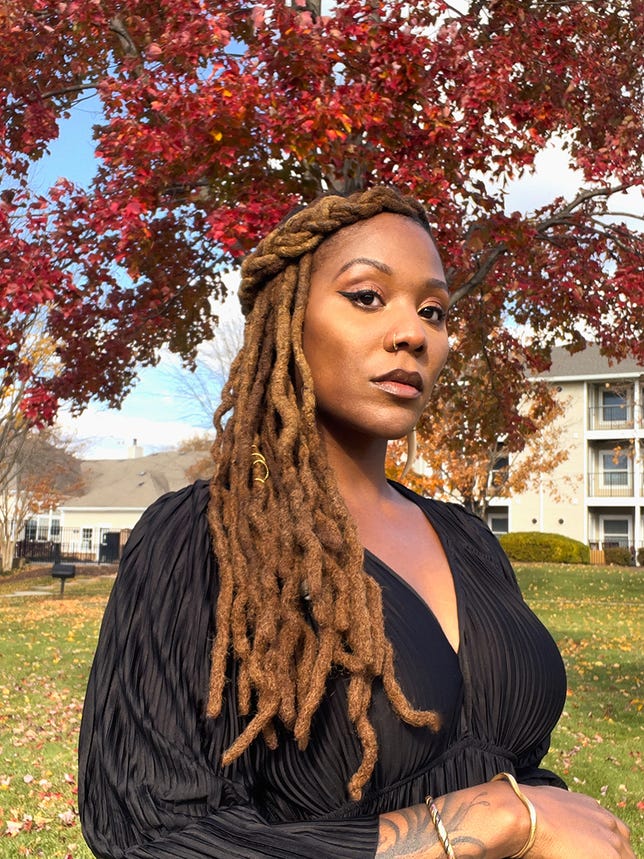
Nanny’s protatgonist, Aisha, is a Senegalese immigrant who strives toward her own American dream while a supernatural presence threatens to unravel it.
Sundance Film FestivalThe Sundance Film Festival awarded one of its biggest prizes to a horror movie for the first time in its nearly 40-year history Friday. But beware: Nanny‘s taut story builds supernatural tension to a shocking climax that knocks the breath out of you.
And you can still stream Nanny this weekend.
Fading in from blackness, the first images of the film reveal the sleeping face of protagonist Aisha, her eyelids fluttering gently, with ripples of white sheets framing her. But the sheets shift, moved by an unseen force, and some ripples reveal themselves to be pooling water lapping her head. As the musical tones shift darker and quiet to silence, Aisha wakes, gasping, a black spider crawling up her cheek.
The spider, the water, the terror felt in that liminal state between waking life and nightmare: These all are threads that writer-director Nikyatu Jusu weaves into a tightly drawn tale, one that introduces beings from West African folklore into a modern-day horror story of one Black immigrant struggling to reunite with her child, as she traverses the menaces of race and class in America.
Aisha, we learn, is a Senegalese immigrant mother, separated from her young son back home. Piecing together her own American dream, she hopes to earn enough to reunite with him in her new country. “Will it be cold?” her son, Lamine, worries over the phone, remembering snowy pictures sent by his mom. “I will have a very warm coat waiting for you,” she reassures him, smiling before Lamine’s image freezes and their video call drops.


Nanny writer-director Nikyatu Jusu has chipped away for about eight years at the project that became Sundance award-winner Nanny.
Sundance Film FestivalWhen she lands a seemingly lucrative job as a nanny to a wealthy white couple in Manhattan, her dream appears within reach. But as she cares for their daughter, a violent supernatural presence gathers force, an undercurrent to the sinister power dynamics between a Black undocumented worker and her privileged white employers.
Nanny is a terrifying film, but the potency of its horror grows from Jusu’s restraint from tropes. The parents don’t flagrantly abuse Aisha to give the film horrifying punch. Their daughter doesn’t devolve into the genre’s evil-child cliche. Nanny has no jump-scares.
Instead, the horror of Nanny is Aisha’s singular tragedy. She’s tormented by menacing forces she’s grappling to fathom, her connection to their West African magic as fragile as the one with her faraway son. The film foreshadows its final twist with clues planted shrewdly along the way. These portents make Nanny’s shocking climax all the more gut-wrenching. (The loudest false note is a coda in the final minutes of the film, with an abrupt tonal shift that washes over you so quickly it’s hard to grok what just happened.)
“The story builds on itself, scene after scene, offering the audience a viscerally spiritual experience, should they choose to embrace it,” Chelsea Barnard, a juror for Sundance 2022‘s US dramatic feature film competition, said of Nanny as she awarded the category’s Grand Jury Prize to a shocked and tearful Jusu.
It’s the same Sundance prize awarded to Minari, which evolved into an Oscar darling last year; and Fruitvale Station, which helped usher director Ryan Coogler to mainstream blockbuster success with Black Panther.
Nanny, like most of Sundance’s indie films, wasn’t created with a studio-backed theatrical-release plan baked in. As of Friday, it hadn’t nailed down a deal for distribution. But Sundance, for the second time in the pandemic, is happening largely online this year, with its movies streaming straight to your living room TV. The victory lap for Sundance winners is virtual too: Nanny has a second-round of online screenings available Saturday and Sunday as part of the festival’s awards weekend.
Single-screening tickets to stream Nanny are $20. Available on both Saturday and Sunday, a single-screening ticket to Nanny unlocks the film until 4:59 a.m. PT Monday morning. But once you start watching 97-minute Nanny, you’re limited to five hours of viewing, during which you can pause and rewind as much as you want. (A $300 Awards Weekend Pass also grants you access to Nanny, plus seven other screenings of prize winners, if you can handle the hefty price tag.)
